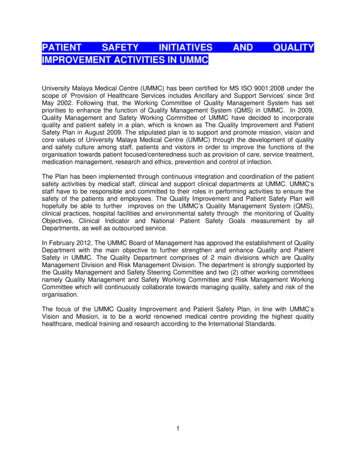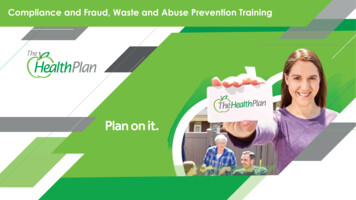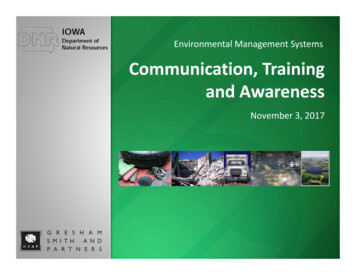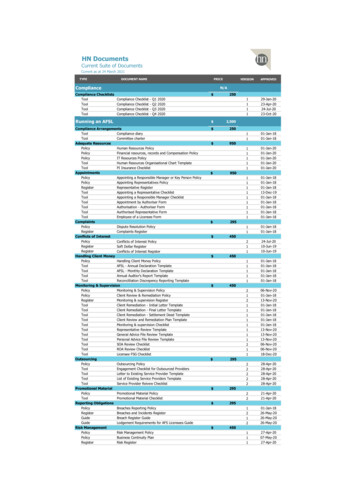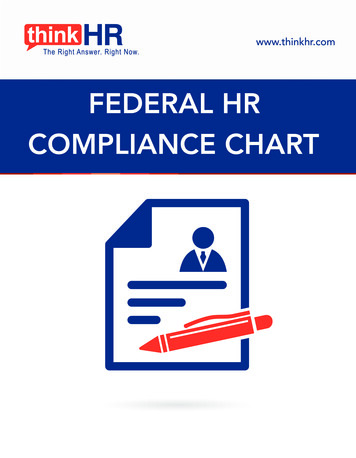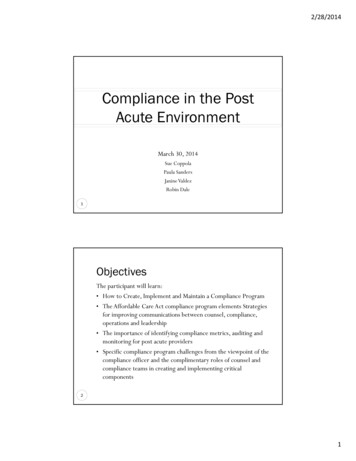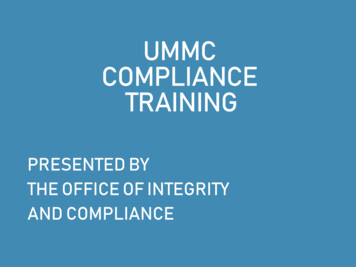
Transcription
UMMCCOMPLIANCETRAININGPRESENTED BYTHE OFFICE OF INTEGRITYAND COMPLIANCE
What is Healthcare Compliance?Healthcare Compliance- meeting expectations- abiding by applicable legal requirements- deterring and detecting violations of the law
UMMCCompliance Program Responsible for the day to day conduct of complianceactivities. Applies to all UMMC workforce, which includes all UMMCstudents, employees, physicians, staff and volunteers. Compliance Program violators will be subject to disciplinaryactions. Disciplinary actions will be taken in accordance withUMMC’s Policy on Sanctions for Plan Violations. Review the Policy.
6-04; Revised 10-07, 5-14, 8-16, 7-17Effective 9-1-17ATTACHMENT 2POLICY ON SANCTIONS FOR PLAN VIOLATIONSIt is the policy of UMMC to provide for disciplinary actions to be taken againstUMMC employees who violate the provisions of the Compliance Plan. Thefollowing list of employee infractions and violations apply to the UMMCCompliance Program. These are supplemental to existing employee disciplinaryguidelines.I.Employee ActionDisciplinary ActionEmployees willfully providing materially Disciplinary action shall be terminationfalse information to UMMC, or a of employment.government agency, patient, insurer, orthe like.EmployeeswillfullydisclosingProtected Health Information (PHI) tounauthorized individuals or entities.Employees intentionally misusing theCompliance Hotline or other reportingmechanism by knowingly and willfullyproviding false information to the Officeof Integrity and Compliance or theCompliance Committee.Employees willfully viewing ProtectedHealth Information for reasons otherthan treatment, payment, health careoperations, approved Research orthose required by law.First Offense: Disciplinary Action shallrange from 10 working days or 80working hours without pay up to andincluding termination.Egregious*situations may result in suspensionpending termination.Second Offense: TerminationEmployeesnegligentlyproviding Disciplinary Action shall range fromincorrect information to UMMC, or a counseling up to and includinggovernment agency, patient, insurer, or termination. Egregious* situations maythe s violating any relevant Stateor Federal Law, Rule, or Regulation.Subsequent or repeat violation shallresult in a progressive application ofEmployees failing to report another disciplinary sanctions.employee's violations of duty pursuantPage 1 of Attachment 2
6-04; Revised 10-07, 5-14, 8-16, 7-17Effective 9-1-17to this Compliance Plan.Employees failing to detect and/orreport conduct by an employee that areasonable person should know iscriminal and could reasonably beexpected to be detected.Employees failing to take action asprescribed under this Compliance Planor to comply with duties expressed orimplied as set forth in this CompliancePlan.Employees engaging in any conductprohibited by the terms of thisCompliance Plan.Employees unintentionally or carelesslyrevealing patient information to oneselfor others for reasons other thantreatment, payment, health careoperations, approved research or thoserequired by law.II.In the event that periodic audits reveal any noncompliant behavior or improper ormistaken billing incidents, all mistaken payments shall be returned to theappropriate payer(s) and a report shall be made to the appropriatesubcommittee. Depending on the nature and severity of the conduct revealedthrough the audit procedure, the disciplinary action as listed above may beinstituted. Appropriate reports mandated by Federal or State law shall be madeas required.Certain factors as listed below may be considered as mitigation in any proposeddisciplinary action: (a) whether the employee promptly reported his/her ownviolation, (b) whether the report constitutes UMMC's first awareness of theviolation and the employee's involvement, and (c) whether the employeecooperated fully in investigating and/or correcting the violation.Any employee disciplinary action resulting from a violation of this CompliancePlan should be coordinated through the Office of Integrity and Compliance andthe Department of Human Resources. Any such disciplinary action must bereviewed by the Compliance Committee to determine if the Compliance Programneeds to be revised.Page 2 of Attachment 2
6-04; Revised 10-07, 5-14, 8-16, 7-17Effective 9-1-17*For purposes of this policy, egregious is defined as behavior or activity obviouslyinconsistent with what is right or proper. Examples of an egregious situationinclude, but are not limited to, the following:1) Accessing a medical record to satisfy your own curiosity related to anissue brought to your attention through social media, a news broadcast,newspaper, or other media source.2) Accessing a large volume of patient information or multiple patients’records without a need to know.Page 3 of Attachment 2
Code of Conduct Conduct business according to high ethical standards. Comply with applicable laws, rules, regulations, and requirementsof third party payers. Sets standards to evaluate situations in a consistent manner. Principles based on common sense, courtesy, ethical and legalconduct. Code of Conduct
IIICODE OF CONDUCTIt is the policy of UMMC that all of the business of UMMC be conducted according to highethical standards, including compliance with applicable laws, rules, and regulations, and therequirements of third party payers. In support of this stated policy, a Code of Conduct isessential for UMMC to prosper and receive the desired trust and respect of its patients,physicians and other health care providers, third party payers, the UMMC workforce, andagents. Set forth in this Code of Conduct is a set of standards to evaluate situations in aconsistent manner and arrive at uniform decisions. The underlying principles of thesestandards are based on common sense, courtesy, ethical and legal conduct that areessential to govern the business of UMMC. It is important that the entire UMMC workforceunderstand these standards and abide by them daily.In furtherance of these principles, UMMC subscribes to the following Code of Conduct:PRINCIPLE 1 - Legal Compliance:We will strive to ensure all activity by or on behalf of the organization is incompliance with applicable laws.The following Standards are intended to provide guidance to the UMMC workforce andsubcontractors to assist them in their obligation to comply with applicable laws. Knowledge(first or second hand) or suspicion of any violation of any law, regulation or rule must bereported to the Compliance Hotline (1-877-310-0424) or other approved reportingmechanisms. We shall not solicit, receive or offer to give anything of value to anyone in exchangefor referral of patients. Bribes or kickbacks of any kind intended to induce referralsare prohibited.We shall not make false statements or representations to any person or entity inorder to gain or retain participation in a program or to obtain payment for anyservice.We shall submit claims for reimbursement accurately and only for servicesrendered.We shall not enter into any agreements with competitors to share or fix prices.We shall maintain complete and accurate health records to support all medicaldecisions and the necessity for diagnostic testing.We shall collect all applicable copayments and deductibles in accordance withpolicy.Revised 7/17
We shall strive to ensure that our contracts conform with all applicable lawsby having them reviewed and approved as required by UMMC policies.We shall store, dispense and transport all drugs and biologicals in accordancewith accepted guidelines.We shall adhere to sound environmental and safety practices, including theproper handling of medical or hazardous waste.We shall respect our obligations as individuals and as health care providers,and neither express nor imply a promise of performance which we cannotreasonably expect to fulfill;We shall assure that all practices of write-offs, discounts, or forgiveness of debtare based solely on justifiable business practices and conform to federal andstate statutes.PRINCIPLE 2 - Quality of Care:We are committed to providing the highest quality of care and delivering servicesin an ethical, professional manner. We shall treat all patients with dignity, respect, and compassion at all times.We shall provide high quality care to all patients without regard to race, color,sex, sexual orientation, gender identity or expression, religion, national origin,age, disability, veteran status, or genetic information.We shall honor the patients’ right to give informed consent. We understandthat informed consent is a continuing process and not just a form.We shall honor the right of patients, or their legal designees, to participatein decision making regarding their care, including refusing treatment to theextent permitted by law and being informed of the consequences of such action.PRINCIPLE 3 - Confidentiality:We shall strive to maintain the confidentiality of patient and otherconfidential information in accordance with applicable legal and ethicalstandards. We shall protect the confidentiality of patient information in accordance withall applicable laws and regulations. We shall refrain from revealing anypersonal or confidential information concerning patients or members unlesssupported by legitimate business or patient care purposes.Revised 7/17
Information and ideas of UMMC are important to organizational success.Information pertaining to our competitive position or business strategies,trade secrets, payment and reimbursement information, and informationrelating to negotiations with the UMMC workforce or third parties should beprotected and shared only with the UMMC workforce having a need to knowsuch information in order to perform their job responsibilities.We shall hold all investigatory information, data, and reports collected and/ormade in connection with compliance issues in the highest confidence and notdisclose such information outside of the confines of the activities of theUMMC Compliance Program, except as is otherwise required by applicablelaw.We shall ensure that information received in confidence is not used for personalgain and divulge no such information with the intent of giving or receivingan unfair advantage in a personal business transaction.PRINCIPLE 4 - Valuing The UMMC Workforce:We value our workforce and are committed to their protection andprofessional success. We shall afford all people equal employment and advancement opportunitieswithout regard to race, color, sex, sexual orientation, gender identity orexpression, religion, national origin, age, disability, veteran status, or geneticinformation.We shall treat each other with respect, dignity, and fairness. Sexualharassment, sexual advances, request for sexual favors or other verbal orphysical conduct of a sexual nature that would create a hostile workingenvironment are absolutely prohibited.We shall exhibit acceptable behaviors, which are those behaviors that enhancethe quality with which we meet the mission of UMMC. Such behaviors includebut are not limited to, those that help promote quality in the work place, integrity,innovation, diversity in the work place and teamwork.We shall refrain from displaying inappropriate behaviors in the work place.Inappropriate behaviors are those that are disruptive to the work place anddisturb day-to-day professional and interpersonal relationships andsurroundings. Examples of such behaviors include:Active behaviors such as: Angry or loud arguing; Verbal/written threats or actions; Cursing or derogatory comments;Revised 7/17
Displaying disrespect to others, intimidating words oractions, bullying;Pounding on desk, door, or wall; orDestroying property or any physical violence such asgrabbing, striking others.Passive behaviors such as: Refusing to complete assigned tasks;Uncooperative attitudes with others;Reluctance or refusal to answer questions;Failure to return phone calls;Failure to return pages or messages; orImpatience in dealing with others.PRINCIPLE 5 - Conflicts of Interest:We shall avoid conflicts or the appearance of conflicts of interest betweenour private interest and the fulfillment of our duties. No member of the workforce may represent UMMC in any transaction in which heor she or a member of their immediate family has a personal interest.We shall not disclose or use confidential, special or inside information of or aboutUMMC for personal profit or advantage.UMMC workforce shall disclose all potentially conflicting activities in the annualConflict of Interest disclosure statement and upon acquiring a new interest.We shall avoid any real or potential conflicts of interest and disclose to UMMC tothe fullest extent possible, any significant proprietary or financial interest in anyorganization with which UMMC does business, as defined in, but not limited to,the Mississippi Code of 1972, sections 25-4-101 through 25-4-119, and theUMMC Faculty and Staff Handbook.PRINCIPLE 6 - Business Relationships:Business transactions with vendors, contractors and other third parties shallbe transacted free from offers or solicitation of gifts and favors or otherimproper inducements in exchange for influence or assistance in a transaction. Gifts. We shall not solicit tips, personal gratuities or gifts from patients or vendors.We shall not accept gifts, favors, services, entertainment or other things of valueto the extent that decision-making of UMMC might be influenced. Similarly, theoffer or giving of money, services or other things of value with the expectation ofRevised 7/17
influencing the decision making process of any purchaser, supplier, customer,government official or other person by UMMC is absolutely prohibited. TheUMMC workforce may retain gifts from vendors that will not influence decisionmaking which have a nominal value of less than 50 per gift and 300 per year inthe aggregate. If there is any concern whether a gift should be accepted, theOffice of Integrity and Compliance should be consulted. We shall recognize that character is the greatest personal asset in businessand give it major consideration in the selection of individuals and companies withwhom we do business.We shall take no action which would otherwise be suspect merely becauseit appears to be customary in a particular location or particular area ofbusiness activity.PRINCIPLE 7 - Protection of Assets/Research:All UMMC workforce shall strive to preserve and protect the organization’s assetsby making prudent and effective use of UMMC resources and properly andaccurately reporting its financial condition. UMMC has established control standards and procedures to ensure that assetsare protected and properly used and that financial records and reports areaccurate and reliable. All workforce of UMMC share the responsibility formaintaining and complying with required internal controls.All financial reports, accounting records, research reports, expense accounts,time sheets and other documents must accurately and clearly represent therelevant facts or the true nature of a transaction.All UMMC workforce are expected to refrain from converting assets of theorganization to personal use. All property and business of the organization shallbe conducted in the manner designed to further UMMC’s interest rather thanthe personal interest of an individual. UMMC workforce are prohibited from theunauthorized use or taking of UMMC’s equipment, supplies, materials orservices.We shall collect and report scientific research validly and accurately.UMMC requires that all workforce of UMMC abide by the principles set forth in this Codeof Conduct. Failure to abide by the principles set forth in this Code of Conduct andthe guidelines for behavior which this Code of Conduct represents may lead todisciplinary action.Any suspected violation of this Code of Conduct must be reported to a member ofRevised 7/17
the UMMC Compliance Committee, the Office of Integrity and Compliance, theCompliance Hotline (1-877-310-0424), or in accordance with any other authorized andposted reporting mechanism. The Compliance Hotline is intended to identify and addressimproper conduct as quickly as possible. All UMMC workforce may make reports to amember of the UMMC Compliance Committee, the Office of Integrity and Compliance,the Compliance Hotline, or in accordance with any other authorized and posted reportingmechanism, without fear of retaliation. Reports of suspected violations may be madeanonymously.It is important that this Code of Conduct be understood and practiced daily by all UMMCworkforce. All UMMC workforce must understand that UMMC will take action to uphold andenforce these standards. This Code of Conduct is adopted in conjunction with the adoptionof the UMMC Compliance Plan and implemented as part of the UMMC ComplianceProgram. This Code of Conduct will be distributed to all current UMMC workforce to readand acknowledge, with the acknowledgment kept on file with UMMC. During annualcompliance training, each member of the workforce will repeat the procedure andelectronically acknowledge the retraining by UMMC. Furthermore, within four weeksof initiating employment with UMMC, or during orientation, new members of the workforcewill read the Code of Conduct and electronically sign the acknowledgment.The following will be considered violations of UMMC's Code of Conduct: Violations, or attempts to commit any violations, of the Compliance Program; Dishonest acts, or attempts to commit any dishonest acts; and All improper or dishonest acts and matters, which have significance with respectto the integrity of books, records, or management of UMMC.Revised 7/17
Major Enforcers and Regulators ofHealthcare ComplianceOffice of theInspectorGeneral(OIG)Office for CivilRights(OCR)Department ofHealth andHumanServices(DHHS)Centers forMedicare ion(DEA)
Healthcare Fraudand AbuseFRAUDABUSE
Healthcare FraudKnowingly and willfully providinginformation in an attempt tofalse-Defraud any private insurance or governmental healthcarebenefit program; or-Obtain, by means of false or fraudulent pretenses,representations, or promises, any of the money or propertyowned by, or under the custody or control of, any healthcarebenefit program.
Healthcare Fraud Examples Intentionally billing for services not rendered; Requesting, offering, or receiving a kickback or bribe; Intentionally using an incorrect or inappropriate providernumber in order to get paid; Selling or sharing patients’ Medicare or Medicaid numbersso false claims can be filed; or Falsifying information on applications, medical records,billing statements, cost reports or any statement filed withthe government.
Healthcare Abuse- Includes any practice not consistent with providing patientswith services that are medically necessary, meet professionallyrecognized standards, and are priced fairly.Abuse may directly or indirectly result in: unnecessary increased costs; improper payment; restrictions to patient choices; or payment for services which fail to meet professionallyrecognized standards of care or that are medicallyunnecessary.
Examples of Abuse Using procedure or revenue codes that describe more extensiveservices than those that were actually performed; Routinely submitting duplicate claims; Billing for unnecessary medical services. For example, alwaysbilling for complete lab profiles when only a single test is necessaryto establish a diagnosis; or Billing for items or services grossly in excess of those needed bythe patients.Although many types of practices may be considered abusive, theymay evolve into fraud.
Fraud and Abuse lawsAnti-kickbackStatuteStark Law
Prohibits offering,paying, soliciting,or receivingfinancial incentivesto induce referralsof items or services*Referrals fromanyoneApplicable to allFederal healthcareprograms*Any items orservicesAnti-KickbackStatuteExceptions:Intent must beproven (knowingand willful)Voluntary safeharborsCriminal and CivilPenalties
Safe Harbors Certain exceptions to the Anti-Kickback rules. “Safe harbors”SafeHarbors
Applicable toMedicare/MedicaidProhibitsphysicians fromreferringpatients toentitiesprovidingdesignatedhealth servicesReferrals from aphysicianSTARKLAWDesignatedhealth ServicesCivil Penalties*Intent requiredfor civilmonetarypenalties forknowingviolations
Stark Law ExceptionsCommon Physician Self-Referral Law ExceptionsArrangements that are related to ownership/investment and compensationFor example: In-office ancillary exceptions, certain contracted physicianservices, academic medical center exception, etc.Arrangements that relate only to ownership/investment interestsFor example: Publically-traded securities, mutual funds, etc.Arrangements related to only compensationFor example: Rental of office space, physician recruitment,bona fide employment relationships
False Claims Act (FCA)The False Claims Act:-Prohibits the submission of falsefraudulent claims to the government.orFalse claims:Claims that the provider knew or should have knownwere false or fraudulent.‘Should have known’ means deliberateignorance or reckless disregard of the truth
False Claims Act (FCA)False claims include claims where theservice:-Is not rendered-Is already covered under another claim-Is miscoded-Is not supported by the patient’s medicalrecord
Violation ScenariosPhysicians pay more than 1.5 millionto government for kickback schemeFour physicians each agreed to a settlement with the USGovernment after being accused of participating in a kickbackscheme causing false claims to be submitted to Medicare inviolation of the Federal False Claims Act, the Physician SelfReferral law (“Stark”), and the Anti-Kickback Statute.Reference: y-more-15-milliongovernment-kickback-scheme
Violation ScenariosRialto Capital Management and current owner of Indianahospital to pay 3.6 million to resolve false claims actallegations arising from kickbacks to referring physiciansThe Department of Justice announced that Rialto CapitalMangement LLC and its former affiliate RL BBIN KRE LLC haveagreed to pay 3.6 million to resolve allegations that Rialto andthe Kentuckiana Medical Center (KMC) violated the AntiKickback Statute, the Stark Law, and the False Claims Act byengaging in illegal financial arrangements with two doctors whoreferred patients to KMC.Reference: llion-resolve-false
Violation ScenariosAurora Health Care, Inc. agrees to pay 12 million to settleallegations under the False Claims Act and Stark LawAurora Health Care, Inc. has agreed to pay 12 million to theUnited States and State of Wisconsin to settle allegations thatAurora violated the False Claims Act by submitting claims toMedicare and Medicaid in violation of the Stark Law.Reference: under-false-claims-act
Civil Monetary Penalties Law (CMPL) Authorizes penalties and assessments on persons whodefraud Medicare or Medicaid or engage in certain otherwrongful conduct. Authorizes persons to be excluded from Federal health careprograms and directs appropriate state agency’s to excludepersons from participating in any state health care programs.
Qui Tam Incentives to report fraud Qui Tam provision – ‘whistleblower’ Strong financial incentive to report –whistleblowers can receive up to 30% of a falseclaims act recovery.
How to Report a Suspected Compliance Violation1) Discuss with your supervisor2) Online reporting violation.html3) Contact the Office of Integrity and Compliance directly at601-815-39444) Contact Compliance Hotline at 877-310-0424
WHAT CAN I DO?
Workforce ObligationsYour job is critical!Ask questions!Be knowledgeable of applicable policies and procedures!Report suspected violations!
Compliance PoliciesCompliance Policies – UMMC Document Centerdocuments.umc.edu Administration Documents OICCompliance Policies – OIC WebsiteUMMC Intranet A-Z Index Compliance
HARASSMENTIN THE WORKPLACE
Harassment is Hostile Environment Verbal or physicalconduct that isolates,degrades, or showshostility or aversiontoward an individualbased on that person’sprotected group.Exists when harassing behaviors: Create an offensive workenvironment. Affect ability to work. Are extreme or pervasive.
Federal Laws State Laws and CompanyPolicies Civil Rights Act of 1964Can go even further andprotect people based on:–––––Title IX of the EducationAmendments of 1972IXMarital StatusPhysical AppearancePolitical AffiliationRegionalismIllnesses such asHIV/AIDS
Title IX of the Education Amendmentsof 1972For UMMC’s Sexual Misconduct, Sexual Assault and SexualHarassment policy and procedures, please see the UMMC policydirectory.UMMC has a designated Title IX Coordinator to coordinate UMMC’scompliance with and respond to inquiries concerning Title IX. Thecontact number for the Title IX Coordinator is 601-815-7978.A person may also file a complaint with the Department of Education'sOffice for Civil Rights regarding an alleged violation of Title IX byvisiting html or calling1-800-421-3481.
If You Feel Harassed Talk to the offender.Be specific.Ask offender to stop.Involve HR as necessary.Follow company guidelines.If You Think You Have Offended Think before you speak. Apologize. Do not repeat the behavior.
Take Responsibility Respect each person.Think before you speak.Report all incidents of harassment.Apologize if you offend someone.Avoid joking about sensitive topics.Policy on Harassment.
HIPAA Privacy Trainingfor Non-EmployeesPresented by theOffice of Integrity and Compliance
This training will help you be familiar with the following: What . is HIPAA?How . does HIPAA apply to UMMC?Why . is HIPAA important?What information is protected?What . can be used to identify a patient?How . can PHI be used and/or disclosed?What patient rights are required by HIPAA?How . does HIPAA affect you and your job?What . steps can you take to protect PHI?When . should you ask questions?How . can you report concerns?
What is HIPAA and how does it apply to UMMC?HIPAA is a federal regulation which requires the University of MississippiMedical Center (UMMC) to protect patient information, establish boundaries onthe uses and disclosures of patient information, hold violators accountable,and provide processes which enable UMMC to meet patients’ privacy rights.According to the regulation, UMMC is a covered entity and held to therequirements of HIPAA. This includes employees, volunteers, trainees, andother persons whose conduct, in the performance of work for UMMC is underthe direct control of UMMC, whether or not they are paid by UMMC.The Privacy Rule also applies to UMMC’s business associates which we contractwith to carry out some of our activities and involves creating, receiving,maintaining, or transmitting protected health information (PHI). UMMC musthave evidence of an agreement specific to the services being provided which iscalled a Business Associate Agreement (BAA).
Why is patient privacy important to UMMC?Privacy is more than a legal and regulatory issue.It is a: A respect issue for all UMMC patients and employees. A trust issue. All patients must be able to trust UMMC and itsemployees to protect their patient information from inappropriateaccess, use, or disclosure.An individual’s perception of a lack of respect and/or privacy can result in hesitancy todisclose vital information to take care of the patient or uncooperative actions.Lack of trust can also lead to decreased patient satisfaction.
What information is protected under HIPAA?Patient information covered under HIPAA is called ProtectedHealth Information (PHI) and can be in any form – written,spoken, printed, or electronic.Protected health information is clinical information, such as anindividual’s diagnosis, in combination with some type ofinformation that allows you to identify that individual.For example, a diagnosis on a progress note that contains thepatient’s name would be considered PHI.
What are some examples of PHI? Documentation created by physicians, nurses, and otherhealth care providers and assembled in medical records; Conversations about an individual's care or treatmentbetween health care providers; Information about patients in UMMC’s computer system; and Billing information about an individual’s health care.
What can be used to identify a patient? Patient’s Name Address or zip code Month and date of service orother relevant date Date of Birth Telephone and/or faxnumber E-mail address Social Security Number Medical Record or patientaccount numbers Vehicle identifiers or serialnumbers Health plan beneficiarynumber Device identifiers or serialnumbers Biometric identifiers, includingfinger & voice prints Full face photographic imagesor other images Web Locators (URLs) orInternet Protocol (IP)addresses Any other unique identifyingnumber, characteristic, or code
How can UMMC use and disclose PHI?
What is the difference between use and disclosure?Use:Information is used by UMMC’s workforce. An example ofinformation being used is when a clinician reviews apatient’s record.Disclosure:Information is disclosed when it is shared with others. Anexample of information being disclosed is wheninformation is sent to a health plan.
What is HIPAA authorization?An authorization is a detailed document that gives UMMCpermission to use protected health information forspecified purposes, which are typically
Revised 7/17 We shall strive to ensure that our contracts conform with all applicable laws by having them reviewed and approved as required by UMMC policies. We shall store, dispense and transport all drugs and biologicals in accordance with accepted guidelines. We shall adhere to sound environmental and safety practices, including the
